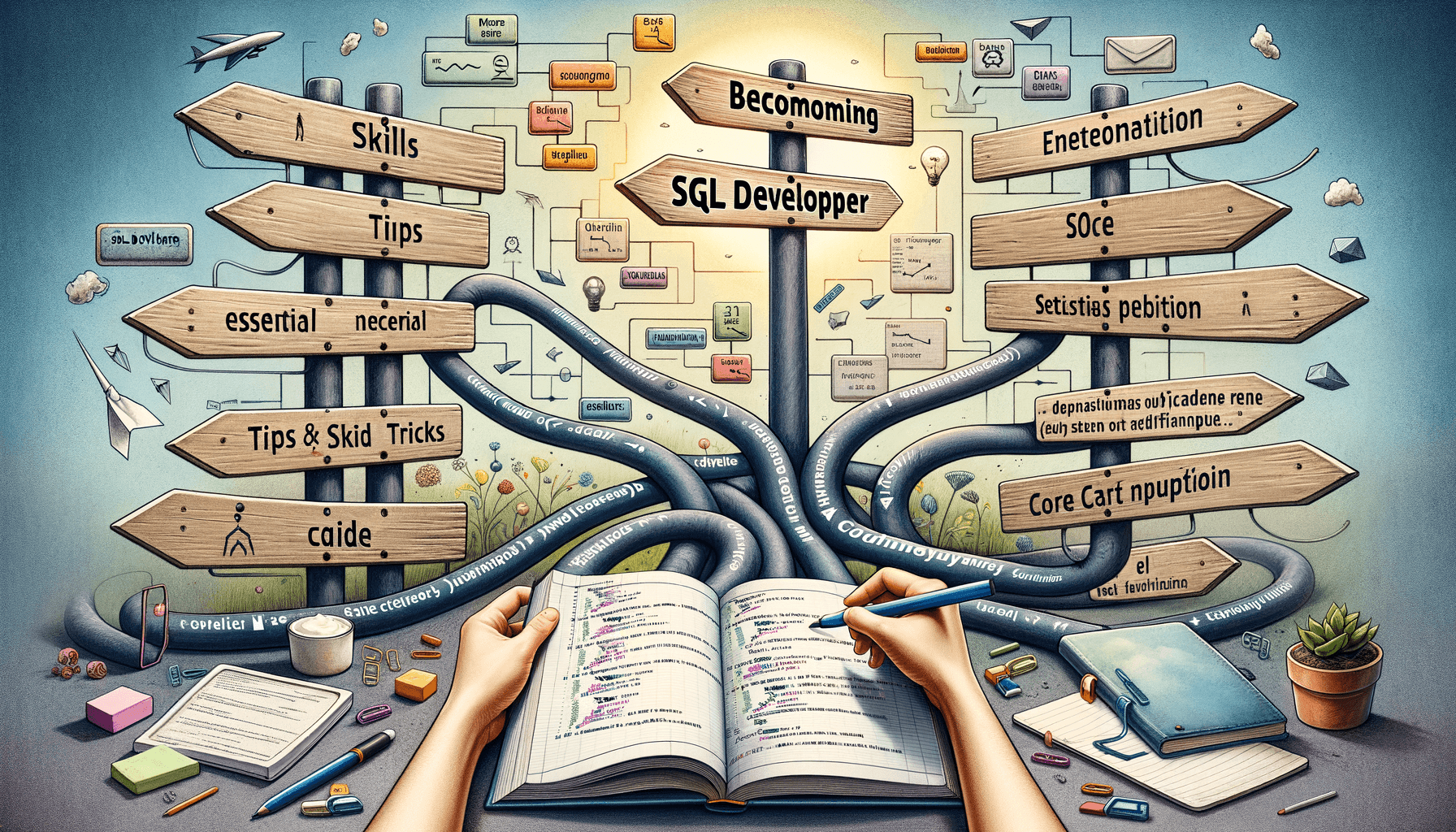A big variety of articles and resources

The Ultimate Guide to Becoming a SQL Developer: Tips, Tricks, and Career Path
 Sia Author and Instructor
Learn SQL
Sia Author and Instructor
Learn SQL
14 minute read
Becoming a SQL developer is a rewarding career path. It offers many opportunities in the tech world. This guide will help you understand what it takes to succeed. From learning basic commands to mastering advanced techniques, you'll find everything you need here. Let's dive into the world of SQL development!
Key Takeaways
- Understand the main duties and skills needed for a SQL developer role.
- Learn about the educational paths and certifications that can boost your career.
- Master the basics and advanced techniques of SQL to improve your skills.
- Discover the importance of data security and how to protect information.
- Explore tools, technologies, and strategies to grow your career and find job opportunities.
Understanding the Role of a SQL Developer
Key Responsibilities
A SQL Developer is responsible for designing, implementing, and maintaining databases. They write SQL queries to retrieve and manipulate data, ensuring data integrity and security. Creating efficient database structures and optimizing queries for performance are also key tasks. Additionally, they collaborate with other developers and stakeholders to meet project requirements.
Essential Skills
To excel as a SQL Developer, one must have a strong grasp of SQL syntax and database management. Familiarity with different database management systems (DBMS) like MySQL, PostgreSQL, and SQL Server is crucial. Problem-solving skills and attention to detail are essential. Understanding data modeling and normalization techniques can significantly enhance performance and data integrity.
Common Misconceptions
Many people think that SQL Developers only write simple queries. However, their role is much more complex. They often work on optimizing large datasets and ensuring the database performs well under heavy load. Another misconception is that SQL Developers don't need to understand the business context. In reality, knowing the business requirements helps in designing better database solutions.
Educational Background and Certifications
Relevant Degrees
To start a career as a SQL Developer, having a degree in Computer Science or Information Technology is very helpful. These programs cover the basics of databases, programming, and data management. Some schools also offer specialized courses in database management, which can be a great advantage.
Industry-Recognized Certifications
Certifications can boost your resume and show your expertise. Some well-known certifications include:
- Microsoft Certified: Azure Database Administrator Associate
- Oracle Certified Professional, MySQL Database Administrator
- IBM Certified Database Administrator
These certifications often require passing exams that test your knowledge and skills in SQL and database management.
Online Courses and Bootcamps
If you prefer a more flexible learning path, online courses and bootcamps are excellent options. Websites like Coursera, Udemy, and edX offer courses that cover everything from basic SQL commands to advanced database design. These courses can be completed at your own pace, making them ideal for working professionals or students.
Investing in your education and earning certifications can significantly enhance your career prospects as a SQL Developer.
Mastering SQL Fundamentals
Basic SQL Commands
To become proficient in SQL, you must first master SQL basics. This includes understanding basic commands like SELECT, INSERT, UPDATE, and DELETE. These commands form the foundation of SQL and are essential for manipulating data in any database.
Data Types and Structures
Understanding data types and structures is crucial for effective database management. SQL databases support various data types, including integers, strings, and dates. Knowing how to use these data types correctly can help you design efficient and reliable databases.
Query Optimization Techniques
Query optimization is a vital skill for any SQL developer. It involves writing efficient queries that run quickly and use minimal resources. Techniques like indexing, query rewriting, and analyzing query execution plans can significantly improve the performance of your SQL queries.
Mastering SQL fundamentals is the first step towards becoming a skilled SQL developer. By learning the basics, understanding data types, and optimizing queries, you can build a strong foundation for your SQL career.
Advanced SQL Techniques
Stored Procedures and Functions
Stored procedures and functions are essential tools in SQL development. They allow you to encapsulate complex logic into reusable blocks of code. This not only makes your SQL scripts cleaner but also improves performance by reducing the amount of data transferred between the database and the application. Stored procedures can be particularly useful for batch processing and repetitive tasks.
Triggers and Events
Triggers and events are mechanisms that automatically execute predefined actions in response to specific changes or conditions in the database. Triggers are often used for maintaining data integrity and enforcing business rules. For example, a trigger can automatically update a timestamp whenever a record is modified. Events, on the other hand, are scheduled tasks that can be set to run at specific intervals, making them ideal for routine maintenance tasks.
Complex Joins and Subqueries
Mastering complex joins and subqueries is crucial for any SQL developer. These techniques allow you to retrieve and manipulate data from multiple tables in a single query. Complex joins, such as INNER JOIN, LEFT JOIN, and CROSS JOIN, enable you to combine rows from two or more tables based on related columns. Subqueries, or nested queries, let you perform operations in a step-by-step manner, breaking down complex problems into simpler, more manageable parts.
Understanding and mastering these advanced SQL techniques will significantly enhance your ability to manage and manipulate data efficiently. They are the building blocks for creating robust, high-performance database applications.
Database Management Systems
Popular DBMS Software
When it comes to Database Management Systems (DBMS), there are several popular options that SQL developers often use. Some of the most widely recognized DBMS software includes:
- MySQL: Known for its reliability and ease of use, MySQL is a favorite among web developers.
- PostgreSQL: This open-source DBMS is praised for its advanced features and compliance with SQL standards.
- Microsoft SQL Server: A robust option often used in enterprise environments.
- Oracle Database: Known for its powerful performance and scalability, especially in large organizations.
Comparing Relational and Non-Relational Databases
Understanding the difference between relational and non-relational databases is crucial for any SQL developer. Relational databases, like MySQL and PostgreSQL, use tables to store data and are excellent for structured data. Non-relational databases, such as MongoDB, store data in a more flexible, document-oriented format. Choosing the right type of database depends on the specific needs of your project.
Database Design Principles
Good database design is essential for efficient data management. Here are some key principles to keep in mind:
- Normalization: This process involves organizing data to reduce redundancy and improve data integrity.
- Denormalization: Sometimes, it's beneficial to introduce redundancy to speed up read operations.
- Use of Primary Keys: Ensure each table has a unique identifier for each record.
- Foreign Keys: These help maintain relationships between tables, ensuring data consistency.
A well-designed database not only improves performance but also makes it easier to manage and scale as your application grows.
Data Security and Compliance
Encryption and Data Masking
In today's digital age, protecting data is more important than ever. Encryption is a method that scrambles data so only authorized users can read it. Data masking, on the other hand, hides sensitive information by replacing it with fake data. These techniques are essential for keeping data safe from hackers.
Regulatory Requirements
Various laws and regulations require companies to protect their data. For example, the GDPR in Europe and HIPAA in the United States set strict rules for data protection. Companies must follow these rules to avoid fines and legal issues. It's important to stay updated on these regulations to ensure compliance.
Best Practices for Data Protection
To keep data secure, follow these best practices:
- Use strong passwords and change them regularly.
- Enable two-factor authentication for an extra layer of security.
- Regularly update software to fix security vulnerabilities.
- Back up data frequently to prevent loss in case of a breach.
In the world of SQL development, understanding and implementing data security measures is not just a good practice—it's a necessity. By following these guidelines, you can help protect sensitive information and ensure compliance with industry standards.
Performance Tuning and Optimization
Indexing Strategies
Indexing is a key part of making your database run faster. By creating indexes on columns that are often used in queries, you can speed up data retrieval. However, too many indexes can slow down write operations. It's important to find a balance.
Query Performance Analysis
Analyzing query performance helps you understand how your database is performing. Tools like query analyzers can show you which queries are taking the most time. This allows you to focus on optimizing those specific queries. For example, a beginner-friendly course on PostgreSQL performance optimization can teach you practical, hands-on learning with expert-led training.
Database Maintenance Tasks
Regular maintenance tasks are essential for keeping your database running smoothly. These tasks include updating statistics, rebuilding indexes, and cleaning up old data. By performing these tasks regularly, you can prevent performance issues before they become major problems.
Efficient learning and focusing on real-world problems can make a big difference in your database performance.
In summary, performance tuning and optimization involve a mix of strategies and regular maintenance. By understanding and applying these techniques, you can ensure your database runs efficiently.
Tools and Technologies for SQL Developers
Integrated Development Environments
When working as a SQL developer, having the right Integrated Development Environment (IDE) can make a huge difference. IDEs like SQL Server Management Studio (SSMS) and Oracle SQL Developer offer features that help you write, debug, and optimize your SQL code. These tools often come with built-in functionalities that simplify complex tasks, making your workflow more efficient.
Version Control Systems
Version control systems are essential for managing changes to your SQL scripts and database schemas. Tools like Git and Subversion allow you to track changes, collaborate with team members, and revert to previous versions if needed. Using version control can save you a lot of headaches by keeping your work organized and easily accessible.
Data Visualization Tools
Data visualization tools help you make sense of the data you manage. Tools like Tableau and Power BI allow you to create interactive dashboards and reports, making it easier to communicate insights to stakeholders. These tools are especially useful for presenting complex data in a more understandable format.
sqlskillz.com offers sql essentials course for it students and professionals. gain practical skills, real-world problem-solving, and expert-led training for career advancement in data management.
Career Development and Networking
Building a Professional Portfolio
Creating a strong portfolio is key to showing your skills as a SQL Developer. Include your best projects, especially those that show your ability to solve real-world problems. Highlight your unique skills and any special techniques you have mastered. This will help you stand out to potential employers.
Joining Industry Associations
Being part of industry groups can open many doors. These associations often offer resources like job boards, training, and networking events. They can also keep you updated on the latest trends and technologies in SQL development. Consider joining groups that focus on both SQL and related fields like data science.
Attending Conferences and Meetups
Conferences and meetups are great places to meet other professionals and learn new things. They offer sessions on the latest tools and techniques, and you can often meet experts in the field. These events are also a good way to learn about job openings and other opportunities. Make it a point to attend at least one major conference each year to stay current and expand your network.
Networking is not just about meeting people; it's about building relationships that can help you grow in your career. Take the time to connect with others and share your knowledge and experiences.
Job Search Strategies for SQL Developers
Crafting a Compelling Resume
Creating a strong resume is the first step to landing a job as a SQL Developer. Highlight your key skills and experience, especially those related to SQL and database management. Make sure to include any relevant projects or internships. A well-organized resume can make a big difference.
Acing Technical Interviews
Technical interviews can be tough, but with the right preparation, you can succeed. Practice common SQL problems and review basic concepts. During the interview, explain your thought process clearly. This shows your problem-solving skills and helps the interviewer understand your approach.
Negotiating Job Offers
Once you receive a job offer, it's important to negotiate. Know your worth and be ready to discuss salary and benefits. Be polite but firm in your negotiations. Remember, it's okay to ask for what you deserve.
Jumpstart your SQL career with free introductory lessons. Go beyond basic SQL training with hands-on projects, personalized support, and industry insights. Instructor Eric Vanier, a specialist in SQL and database performance optimization, can guide you through the process.
Future Trends in SQL Development
Emerging Technologies
The world of SQL development is always changing. New technologies are coming up that make working with data easier and faster. For example, cloud databases are becoming more popular. They let you store and manage data online, which can save time and money. Keeping up with these new tools is important if you want to stay ahead in your career.
Impact of AI and Machine Learning
AI and machine learning are also making a big impact on SQL development. These technologies can help you find patterns in data that you might not see on your own. They can also automate some tasks, making your work more efficient. Imagine a blog page on sqlskillz.com featuring SQL tutorials, tips, and insights. You could use AI to analyze which topics are most popular and focus on those.
Evolving Industry Standards
Industry standards for SQL are always changing. New rules and best practices come out all the time. It's important to stay updated so you can write code that is both effective and secure. One way to do this is to explore online SQL courses, articles, and resources for beginners. These can help you learn about the latest trends and compare with other platforms.
Staying updated with the latest trends in SQL development is crucial for long-term success. It helps you stay competitive and ensures that your skills remain relevant.
The future of SQL development is bright, with new trends emerging that will shape the industry. From advanced data analytics to AI integration, the possibilities are endless. Stay ahead of the curve by exploring these trends on our website. Don't miss out on the opportunity to enhance your skills and advance your career!
Conclusion
Becoming a SQL developer is a journey that requires dedication and practice. By following the tips and tricks shared in this guide, you can build a strong foundation in SQL and advance your career. Remember, the key to success is continuous learning and staying updated with the latest trends and technologies. Whether you are just starting out or looking to enhance your skills, there is always room for growth. Keep practicing, stay curious, and you will find yourself becoming a proficient SQL developer.
Frequently Asked Questions
What does a SQL Developer do?
A SQL Developer writes and manages code to handle databases. They make sure data is stored correctly and can be retrieved when needed.
What skills are important for a SQL Developer?
Important skills include knowing SQL commands, understanding database design, and being able to optimize queries for better performance.
Do I need a degree to become a SQL Developer?
While a degree can help, it's not always necessary. Many SQL Developers learn through online courses, bootcamps, or self-study.
What are some common misconceptions about SQL Developers?
Some people think SQL Developers only write code, but they also design databases, ensure data security, and work on improving performance.
What certifications are useful for a SQL Developer?
Certifications like Microsoft Certified: Azure Data Fundamentals or Oracle Certified Professional can be very helpful in proving your skills.
How can I improve my SQL skills?
Practice regularly, take online courses, and work on real projects. Joining forums and communities can also help you learn from others.
What tools do SQL Developers use?
They use tools like SQL Server Management Studio (SSMS), version control systems like Git, and data visualization tools like Tableau.
What is the future of SQL Development?
The future looks bright with new technologies and the growing use of AI and machine learning, which will create more opportunities for SQL Developers.
Related Articles

How to Find Duplicate Values in SQL: A Comprehensive Guide
14 minute read

Learn SQL vs NoSQL - SQL Interview Prep Ep. 1
4 minute read





